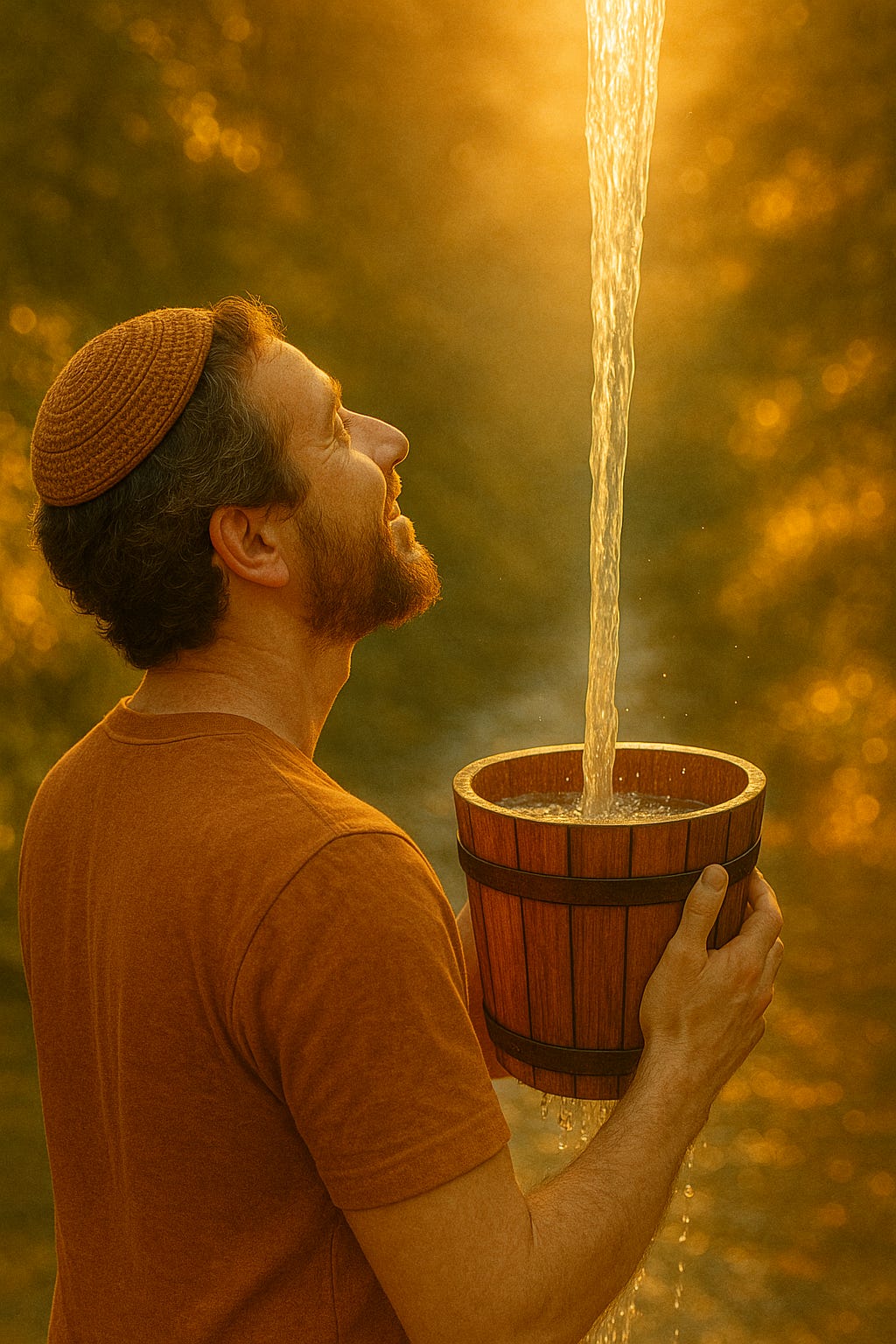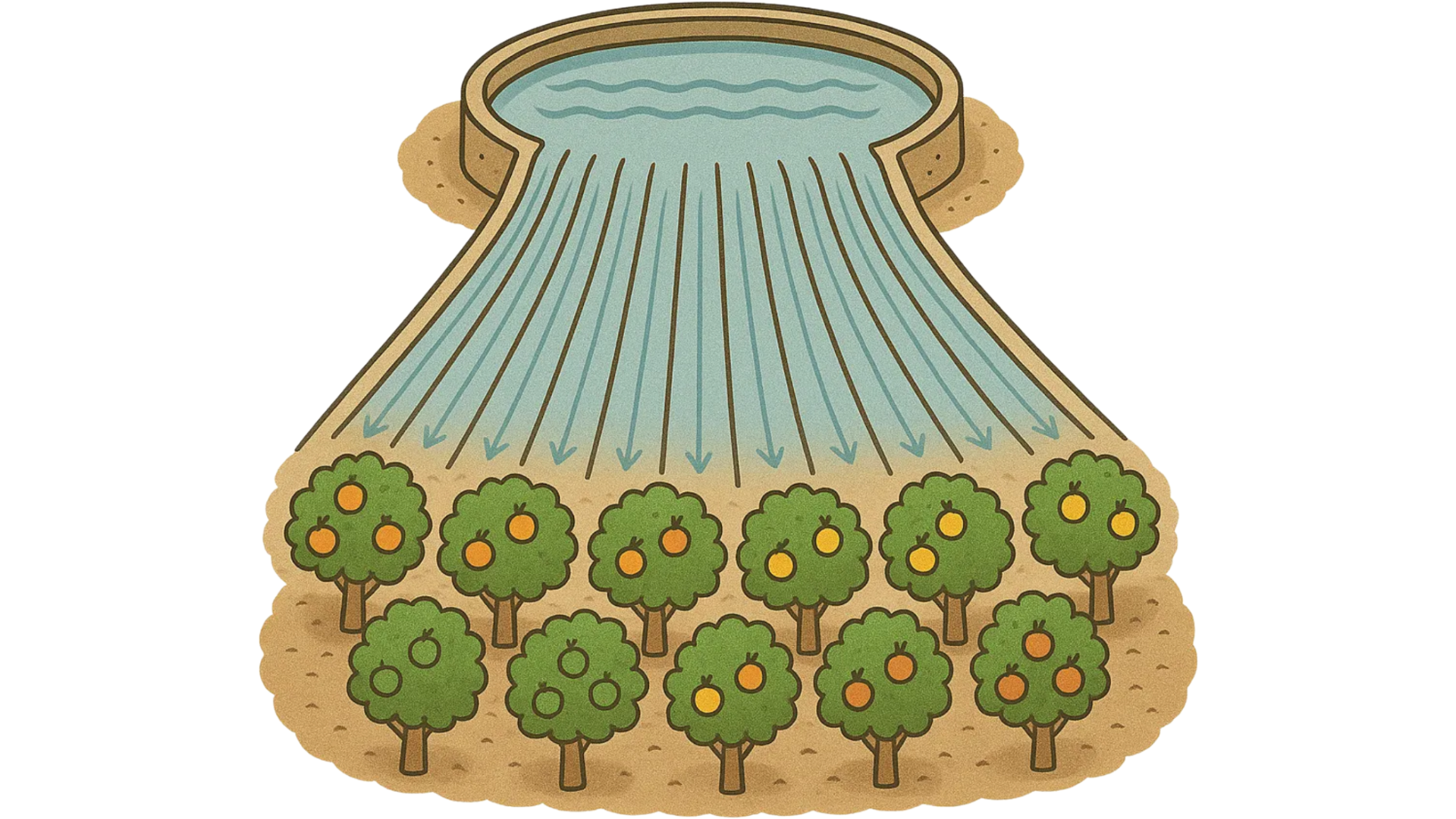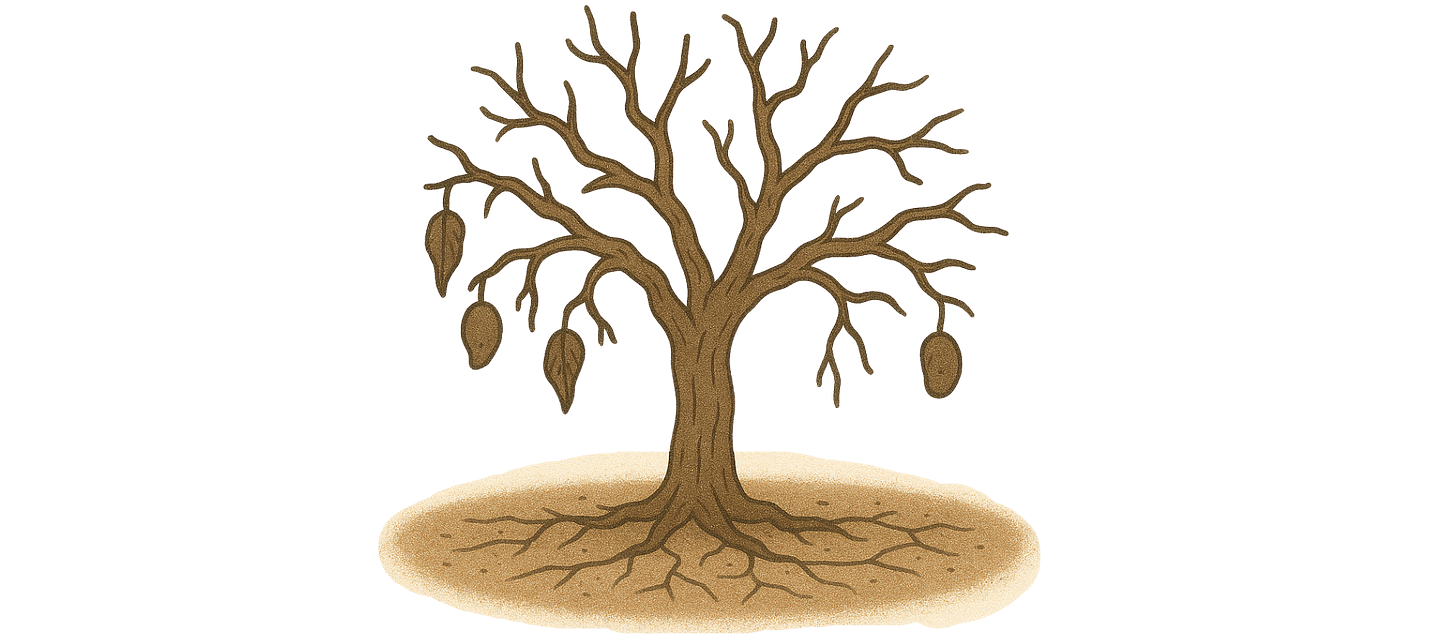Abundance
Being Blessed & Making Blessings
One of the most repeated words in Jewish prayer and practice is Baruch-ברוך.
It’s also one of the most poorly understood.
Baruch-ברוך is usually translated as “blessed.” It’s uttered hundreds of times a day, most often in the form of:
…ברוך אתה ה׳ א-הינו מלך העולם
“Baruch Ata Adonai Eloheinu Melech HaOlam…”
“Blessed are You Hashem our God, King of the Universe…”
If you stop to think about it, though, you’ll realize that it’s quite an odd thing to say to God.
Isn’t HE the One Who is doing the blessing?
Doesn’t referring to Him as “blessed” imply that someone else is blessing Him???
It sounds downright heretical, actually.
But even in English, the word “blessing” is confusing:
On the one hand, we talk about the “blessings in our lives” like health and wealth…
On the other hand, we talk about “making blessings” like the blessings we make before we eat…
These are two separate concepts. Why do they use the same word to refer to both?
We need a deeper, more precise understanding of blessing — one that can change our day and the way we pray.
The great medieval authority on Jewish legal theory and law Rabbi Shlomo ibn Aderet, known as the “Rashba”1 (Barcelona, 1235–1310) was one of the first to put in writing the inner secret of what blessing is. His explanation resolves our questions, and if you put it into practice, it can transform the experience of making a blessing from a mumbled ritual into deep micro-meditation that can transform your life like a steady drip of water on a rock.
The word beracha-בְּרָכָה is almost identical to the word bereicha-בְּרֵכָה, a “pool [of water]” designed with channels to irrigate the crops below.2
What’s the connection between blessings and pools? Berachot and bereichot?
God’s kindness that brought the universe into being out of absolute nothing, and maintains it in existence is absolutely boundless.
We are surrounded by this boundless abundance, but are usually oblivious to it.
It’s like there’s an infinite pool of water, which we can draw from, but not if we’re not aware of it.
What opens these channels to this abundance?
The awareness that its there, and the appreciation for being able to drink from it.
Every small increase in awareness and gratitude — every beracha — opens a channel for His blessing to flow into our lives. In this way, the blessings we articulate are the other side of the coin of the blessings we possess.
While berachot are normally thought of as austere religious incantations, they are really meant to be more like micro-gratitude-meditations that help us recognize the blessings in our lives as blessings. They do this by tracing them back to their ultimate source:
The Infinite pool of Hashem’s boundless kindness.3
After a couple of decades of practice, I no longer just shove a piece of food into my mouth the moment I feel like eating it. Instead, I pause for a moment to consider: does it grow directly from the ground, or from a tree that produces fruit year after year? Let’s say it’s a piece of mango (I love mango). Upon recalling that it’s the latter, I try to appreciate how incredible it is that there exists such a thing as a “fruit tree” — a living organism that yields dividends year after year. I then proceed to make the appropriate beracha of borei peri ha’etz for tree fruit — to consciously appreciate this sweet, tangy, soft, and leathery experience of mangoness I’m about to partake of. As a tree fruit, it is quite literally a gift that keeps on giving from the Creator Who made it for my enjoyment.
By recognizing the abundance we already have, we open the channels for more abundance to appear.
The more I appreciate my blessings as blessings the more the One Who wants to bless me will bless me.
By recognizing the abundance we already have, we open the channels for more abundance to appear.
The more I appreciate my blessings as blessings the more the One Who wants to bless me will bless me.
The key factor that affects the blessings in our lives is the degree to which we feel blessed by them. Health, for example, is one of the greatest blessings. We should jump out of bed with joy if we wake up healthy. But specifically those who are blessed to be healthy tend not to see it this way. We don’t because we take it to be normal. Static. We tend to not see health as a blessing from on high, but as a frozen, default state.
We’re surrounded by blessings, but don’t always feel blessed because we take them for granted, not as gifts intentionally given.4
“We’re surrounded by blessings, but don’t always feel blessed because we take them for granted, not as gifts intentionally given.”
Now, we can answer our initial questions:
If we appreciate that our appreciation matters — that our consciousness is not a random accident of the universe, but rather that which gives the universe its meaning — we actually CAN “bless” G-d.
The more aware we are that He is the Source of our abundant blessings, the more blessed we realize we are. This awareness opens new channels for His blessings to flow down on us. Although God Himself is unchanged by our blessings, the abundance of awareness and appreciation of God in the world actually increases as a function of our awareness and appreciation of His Presence in our lives.5.
If we verbalize our blessings — not in a tacky, screaming from the rooftops way, but in a sincere and meaningful way — this God-consciousness multiplies, and the world, quite literally, becomes more filled with blessing as a result.
If we verbalize our blessings — not in a tacky, screaming from the rooftops way, but in a sincere and meaningful way — this God-consciousness multiplies, and the world, quite literally, becomes more filled with blessing as a result.
In this way, we can truly say that God is “blessed” — by us — as we humbly recognize His blessings in our lives.
ברוך אתה ה׳ א-להינו מלך העולם שהכל נהיה בדברו
ּּHow manifest are You Hashem, our God, King of the Universe, Who brings everything into existence with His word.
Just like “Rashi” is an acronym for “Rabbi Shlomo Itzchaki,” and “Rambam” for “Rabbi Moshe Ben Maimon,” “Rashba” is an acronym for “Rabbi Shlomo Ben Aderet.”
Here’s the original text of the Teshuvot HaRashba V:51.
In modern Hebrew, the word bereicha-בריכה is a swimming pool, but in Biblical Hebrew, it is specifically a pool that flows through channels to irrigate fields. King Solomon used this word when describing the irrigation system in his royal palace.
Kohelet 2:6:
.עָשִׂיתִי לִי בְּרֵכוֹת מָיִם לְהַשְׁקוֹת מֵהֶם יַעַר צוֹמֵחַ עֵצִים
“I constructed pools of water to irrigate a forest sprouting trees.”
Why is water the metaphor for blessing?
Our world is an orchard. Everything and everyone in the world has potential that needs to be nurtured in order to grow.
The “water” that stimulates this growth is what we call “blessing.”
A perfectly good mango seed, even if planted in perfectly fertile soil, will never become the mango tree it was capable of becoming without enough water.
So too, a child might have perfectly good genes, and be surrounded by opportunities, but if his potential isn’t watered with love, encouragement, health, financial resources, and the right opportunities to succeed, he won’t grow to his potential.
A loose translation of “blessing” into more familiar, secular language is “luck.” If a person opens a business, others will whimsically wish him or her “good luck,” with the understanding that aside from hard work, success depends on serendipitous factors outside of the entrepreneur’s control. The big difference is that whereas the notion of luck is giant roulette wheel, blessings flow intentionally and lovingly from the One Who runs the universe to arrive at the right recipient, in the right place, at the right time.
One reason we struggle with the experience of blessing is that the illusion of control is particularly thick in the modern world. When the world’s economy was more agriculturally based, the experience of blessing was clearer and more common. Even the hardest working farmer spent much of his days squinting at the sky hoping for precipitation to make his work yield fruit. As soon as cool drops of rain would start landing on his face, he would naturally feel blessed and smile.
Unfortunately, we tend to only perceive blessings as blessings when we experience the possibility of their ceasing. Technology has made our access to the things we want unceasing, and ironically this has led us to feel less blessed.
This idea is quite clear in the Rashba, and perhaps clearer still in the writings of Rabbi Chaim of Volozhin (1749-1821), specifically Nefesh HaChaim II:2. They both explain this concept using an otherwise incomprehensible piece from the Talmud Berchot 7a of G-d asking a Kohen Gadol (High Priest) to bless Him, which he does.








Regarding “We don’t because we take it to be normal. Static. We tend to not see health as a blessing from on high, but as a frozen, default state.”——yes. We should have another blessing of thanks for health.
Regarding “As a tree fruit, it is quite literally a gift that keeps on giving from the Creator Who made it for my enjoyment.”——not only for enjoyment, it is healing withe vitamin C, et al.